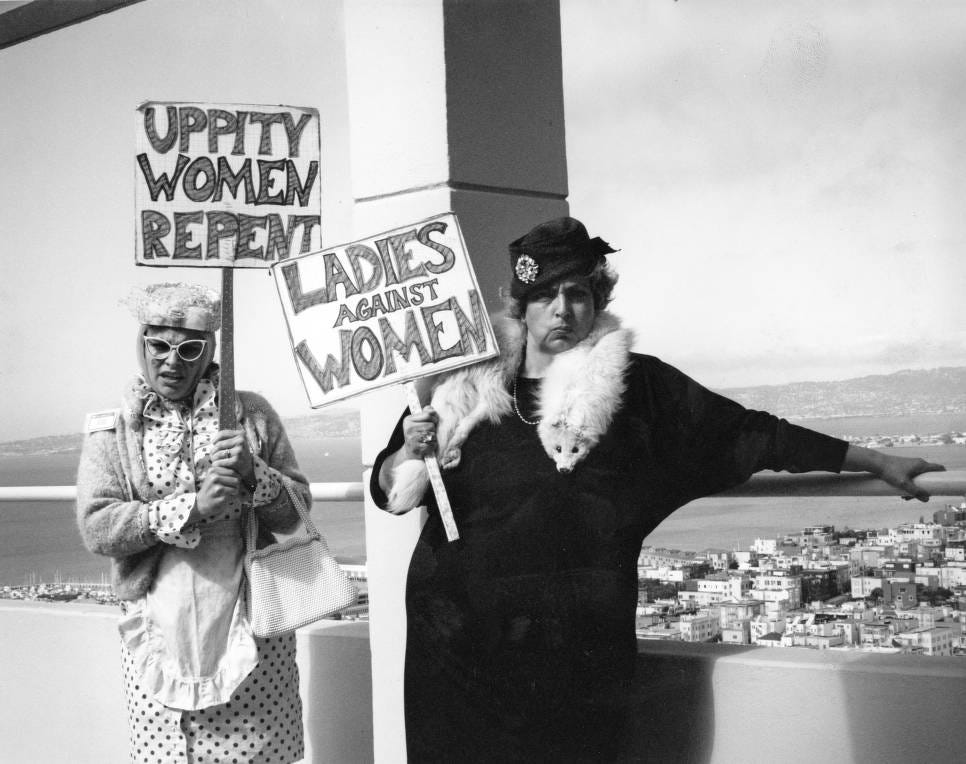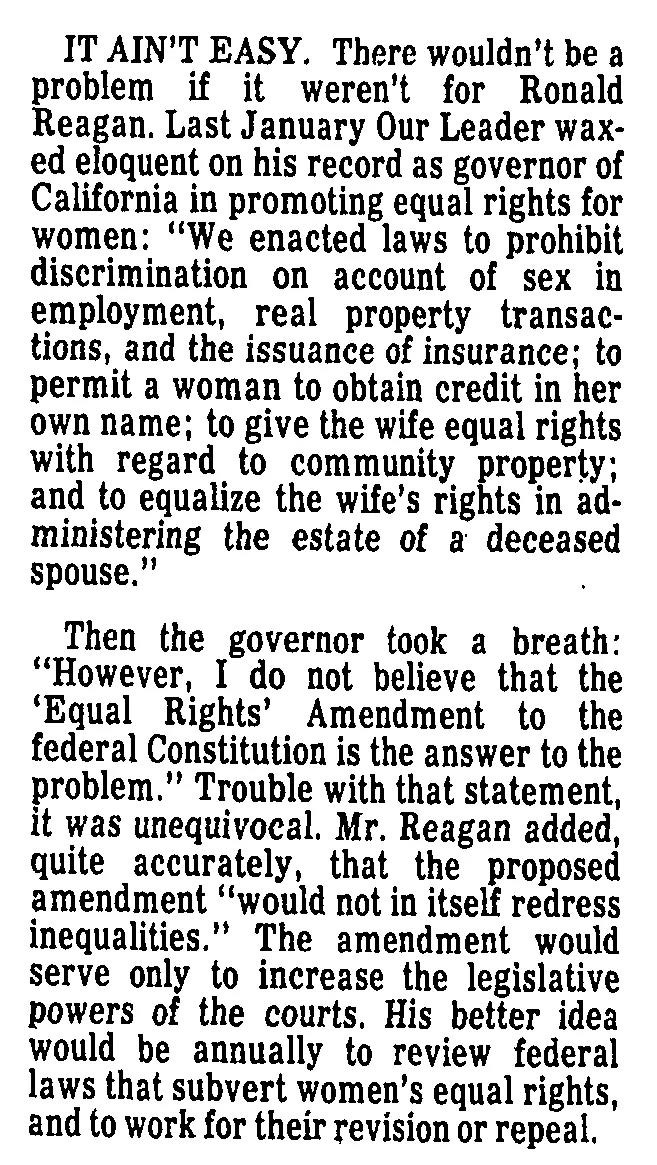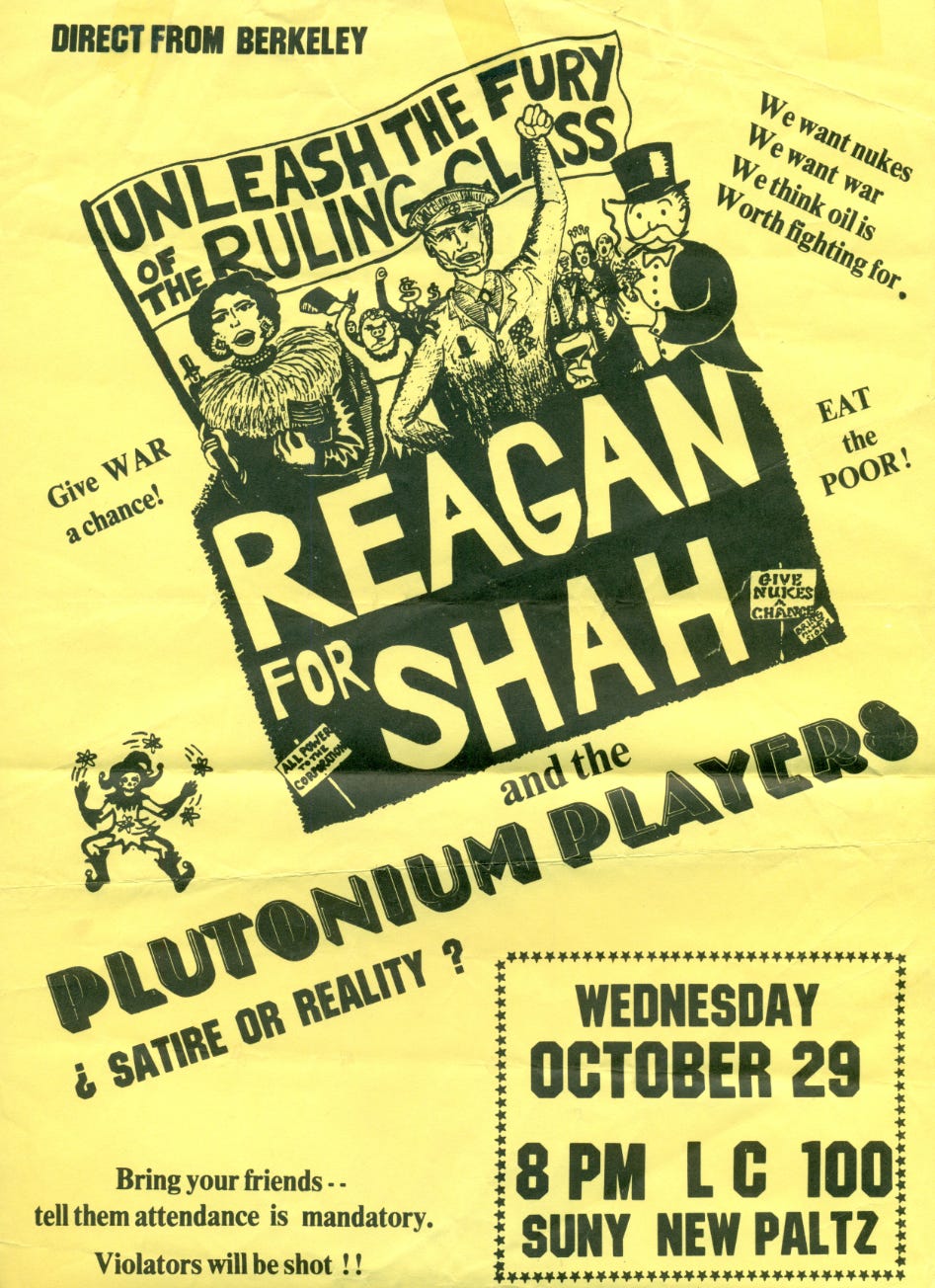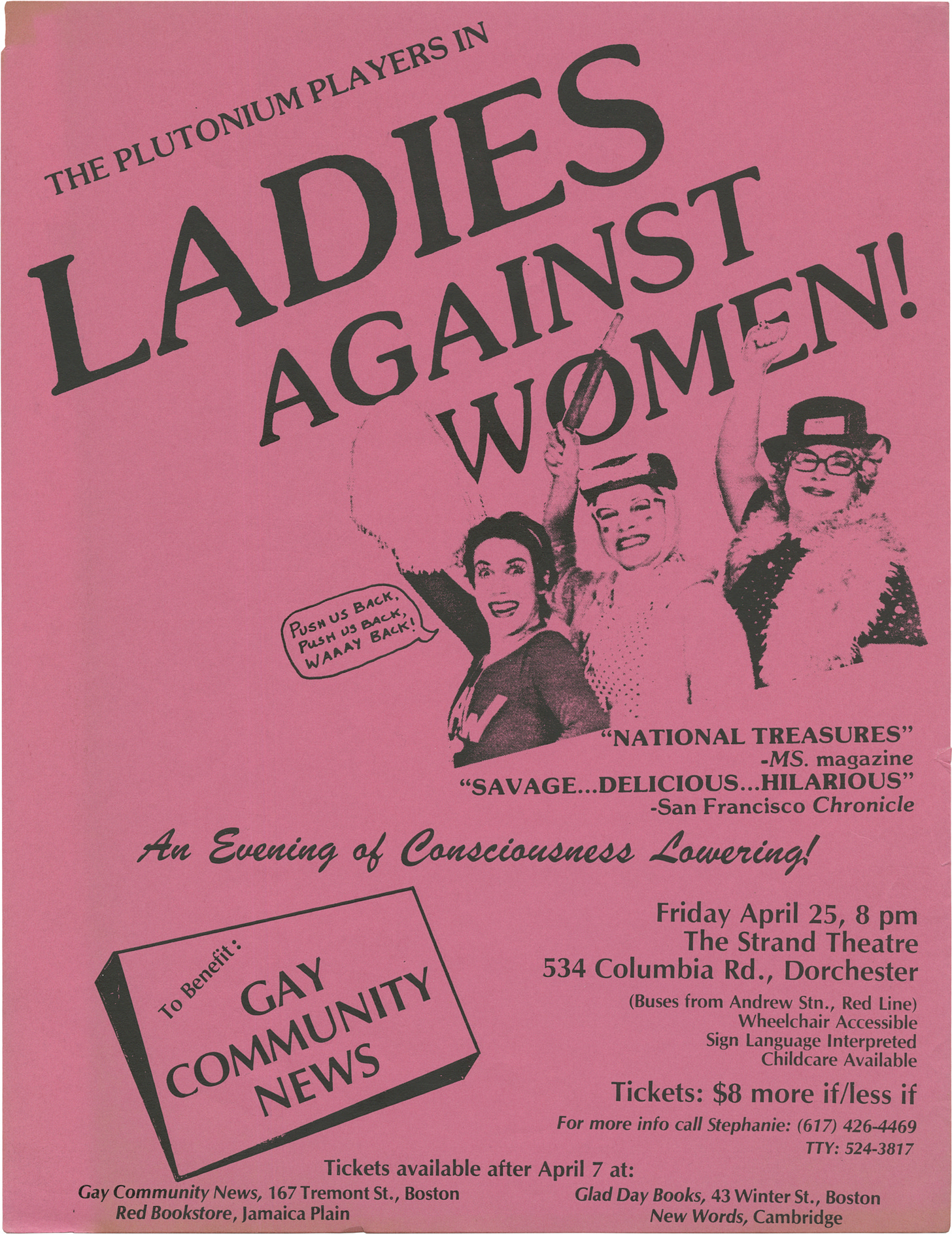Predictably and lamentably, once again as a United States female presidential candidate makes headlines, so does misogyny.
Men against women, boys against women, women against women, extremists against women, political wingnuts against women, social systems and environments against women, gender stereotypes reinforced, patriarchal power structures defended—all rearing their heads on the internet and in the real world but was also decades-ago fodder for the company known as Ladies Against Women (LAW).

A quarter of a century before Stephen Colbert played a fictional over-the-top conservative pundit who shared his name on “The Colbert Report,” Gail Ann Williams helped to create the Plutonium Players in Berkeley, California.
The Plutonium Players were a feminist guerilla theatre troupe committed to satirizing anti-feminist politics and Reagan-era conservatism.
While serving as Governor of California, Ronald Reagan supported the Equal Rights Amendment (ERA), a constitutional amendment that would guarantee legal gender equality for women and men, and offered to help women's groups achieve its ratification.
However, as president of the U.S., Reagan opposed the ratification of the ERA, which he had announced during the 1980 Republican National Convention (RNC) held in Detroit, Michigan.

Guerilla theatre was borne out of 1960s street theatre and performance art, protesting things like capitalism and the Vietnam War. Abbie Hoffman and the Youth International Party, Allan Kapow and his “happenings,” Bread and Puppet Theater, all engaged in guerilla theatre as a means of protest in the ‘60s and ‘70s with the term itself originating from R.G. Davis of the satirical San Francisco Mime Troupe, a group engaged in public performance to comment on perceived political repression.
An early Plutonium Players gig was performing at “Decommissioning Boogie,” a dance event at an anti-nuke conference at Humboldt State University in 1979 where a technical assistant on the movie The China Syndrome led decommissioning workshops. Another troupe project was the Reagan for Shah campaign and committee, which received national attention after protestors holding signs sporting the slogan were arrested near the 1980 RNC (and, apparently, inspired this 1982 track by Eureka, California experimental industrial band Psyclones).
The Reagan for Shah Committee was gathering momentum as they traveled making appearances. Dave Lippman, whose song “Old Joe Corey” was recorded by Country Joe McDonald, joined the Plutonium Players for the Reagan for Shah campaign playing George Shrub, the Singing CIA Agent. Shrub would later join the Players’ next project, Ladies Against Women, as security detail.
Williams portrayed the character Virginia Cholesterol, founder of Ladies Against Women, a fictitious group included in the Reagan for Shah coalition’s “membership list” alongside Mutants for a Radioactive Environment, Union of Concerned Capitalists, the National Grenade Owners Association, the National Association for the Advancement of Rich People, and the John Wayne Peace Institute, among others.
Soon after, Williams’ creation Ladies Against Women branched out as its own act and toured the country, dressed up in 1950s-era conservative clothes and white gloves, and appearing at campuses and protests across the country with their ironic signs and chants. They would also send materials to those interested in starting their own LAW chapters in different cities, so then a network of feminist street theater companies emerged.
LAW marched in the 1981 Doo Dah Parade in Pasadena, California, an annual event which is itself a form of satire and performance art, created to be the opposite of the town’s famed Rose Parade.
In April 1982, they were at Oberlin College for the Student Conference on Reproductive Rights. Performers, who boasted names such as Phyllis Shifty, Fancy Reagan, Jerry Feelbad, and Anita Tyrant, chanted slogans like “We don’t need the ERA, Ronald Reagan will pay our way,” “Warfare, not welfare,” and “Suffering, not suffrage; repeal the vote!”
You can read how the Cleveland chapter of LAW “flummoxed” anti-ERA lawyer and conservative operative Phyllis Schlafly in 1982, armed with signs that read:
“My home is his castle”
“Save the males”
“59 cents is too much. Real ladies do it for free”
“I’d rather be ironing”
“Outlaw Masturbation: Billions of future draftees are murdered by this practice”
“Sperm Are People, Too”
“Tasting it is wasting it”
“Keep America Strong; Invade a Broad”
Schlafly didn’t get it. She said she thought they dressed “foolishly,” “made idiots of themselves,” and “if they had a point, no one got it,” betraying her own lack of a sense of irony.
One could make the argument that the idea of Ladies Against Women resides at the intersection of circles in the Venn diagram of Horatian and Juvenalian satire. That is, while it is indeed funny and light-hearted to a large degree, it comes from a dark place of anger, rage, frustration, and resentment. Nonetheless, it is pure irony—with a healthy dose of parody—through and through. Comedy as not just relief but as protest, resistance, an artillery of ideas.
Ladies Against Women’s challenge was that much of their audience were already in on the gag, somewhat becoming a “preaching to the choir” situation, and therefore at times seeming less “guerilla” and more pandering, at least for the stage revue and their appearances at progressive events. A pull quote from a 1987 San Francisco Sentinel review of LAW’s show An Evening of Consciousness Lowering by Dennis Harvey reads, “Ladies Against Women is essentially a colossal in-joke for those who consider right-wing Americana something that’s already a self-parody.”
However, the article ends with an observation of not only LAW’s strength, but that of guerilla theatre:
“In some ways the best part of An Evening of Consciousness Lowering was a slide show of LAW offshoot-chapter members confounding the great unrepentant public-at-large over the years—turning up to “protest” a women’s bookstore in Toronto (reading being something best left to the menfolk, anyway) and helming a “Bake Sale for the Deficit” (1 Ho-Ho = $17 billion) outside the 1984 Republican National Convention in Dallas. The recorded reactions of female conventioneers is priceless, the imperturbable silliness of the Ladies fearless. This is real guerilla theatre—getting out on the streets and facing the enemy with a cartoon of themselves. Even if the enemy rarely gets the joke.”
There seem to be few, if any, LAW appearances over the last two decades. Maybe they’re waiting on you to start a new chapter. One could argue they are needed, or might be appreciated, now more than ever in the post-#metoo “grab ‘em by the pussy” world, but then again, some have declared irony dead, or that it has died many deaths, in the 21st century.
Williams herself has moved on to project management consulting as well as media relations for small breweries.
There is a short 2003 documentary by Vermont filmmaker Ted Wessel, covering the appearance of LAW at a parade in Westminster West. We see the ladies nearly a quarter of a century later in the era of George W. Bush still in their anachronistic garb, carrying their ironic signs, and chanting things like, “What do we want? Nothing! When do we want it? Now!” and “It’s time to take our country back, one step forward, three steps back!”
The film ends with two male parade-watchers commenting on LAW, and you’re not certain if these guys are in on the joke and performing satire themselves or if they are clear examples of why Ladies Against Women exist in the first place.
“I generally don’t like to see ladies out in public being vocal, but in this case, they had sort of a proper subservient attitude. I felt more comfortable with it,” said the first.
The second added, “They seem to have a lot of time on their hands. I’m not sure why. Somebody could keep them busier.”








